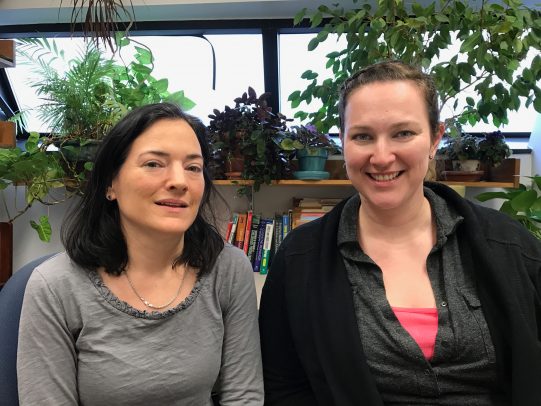UIC College of Social Work receives $1.9 million grant to increase integrated behavioral health workforce

Sonya Leathers, principal investigator, and Catherine Melka-Kaffer, the program’s training director.
UIC Jane Addams College of Social Work (JACSW) has received a $1.91 million grant from the Health Resources and Services Administration (HRSA) to train 116 graduate social work students in the delivery of integrated behavioral health care in marginalized Chicago communities.
Sonya Leathers, principal investigator on the four-year project, said there is a real need for training in integrated behavioral health care, particularly for social workers who will work in Chicago’s most high need areas. She cites statistics from the Chicago Department of Public Health that show that of people below the poverty line, 22.2 percent report a diagnosis of depression and 10.3 percent report serious psychological distress. Chicago has many service gaps with respect to behavioral health, and Leathers points to the treatment of depression among youth, trauma-related responses such as PTSD, and the unique mental health needs of older adults as common examples.
“Our hope is that an integrated care model will be effective in addressing these kinds of needs,” said Leathers, professor of social work. “Integrating primary and behavioral health care increases access to behavioral health services for vulnerable clients who could have the most difficulty accessing these services.”
What is integrated behavioral health care?
Fundamentally, it is the integration of behavioral health, which encompasses both mental health and substance abuse, into primary care settings. This may include family clinics or internists’ offices, or other locations that rely heavily on nursing care, such as assisted living facilities.
“In these settings, social workers will work in direct coordination with primary care providers to increase access to behavioral health services for individuals impacted by health disparities,” Leathers said. “Rather than seeing a person as compartmentalized, physical health separate from mental health, the two go hand in hand. Mental health supports physical health, and vice versa.”
Catherine Melka-Kaffer, the program’s training director, notes that in addition to creating a skilled workforce that can deliver such services, the project also aims to increase opportunities for implementing such an approach at the community level.
“Part of my position involves outreach to integrated care settings to increase students’ access to these types of training experiences,” she said. “This supports an integrated service model by increasing the number of social workers prepared to work in these settings.”
Toward that goal, students accepted into the program will receive a stipend to help ensure completion of the training.
“MSW students complete the training on top of the regular coursework for their degree, so it’s more demanding. Many of our working students lose income because of the additional time involved,” Leathers said. “We’re thrilled to provide financial support so that the students become fully trained to deliver evidence-based practices in impacted communities.”
Using an evidence-based approach
Evidence-based practice is a priority at JACSW, and the new behavioral health training program is no exception. Students are trained to use evidence-based practices that have been developed and found to be effective in diverse populations, to ensure that the interventions are appropriate for clients the program’s students will serve.
“For example, our program provides training in short-term cognitive behavior interventions and exposure to motivational interviewing, which is effective with people who have both behavioral health and medical issues,” Leathers explained. “Another example is behavioral parenting interventions for children with behavioral problems, which generally has positive effects on children’s behavior problems and can be adapted for different types of settings. Our plan is to train students in interventions that will produce positive outcomes in the community.”
Cross-Cultural competence for diverse populations
Chicago has a very diverse population and JACSW traditionally has a diverse student body.
“One-third of the students in our training program are bilingual,” Leathers said. “But often one of the limitations in providing services to non-English speaking populations is the lack of evidence-based practice materials in other languages, so whenever possible we’ve selected interventions that include bilingual materials.”
As an example, Melka-Kaffer cites the choice of MATCH (Modular Approach to Therapy for Children with Anxiety, Depression, Trauma or Conduct Problems). In addition to being an effective intervention, this protocol provides materials in both English and Spanish. The training program also helps bilingual students connect with field placements that have bilingual clinicians in order to learn clinical skills in their second language.
Track record of getting evidence-based behavioral health practices into the community
Leathers and her team are currently completing a training program funded through a prior HRSA grant that has focused exclusively on behavioral health in children, adolescents, and transitional age youth. “So as we begin training under this new grant, we’re building on expertise that we’ve already developed in behavioral health care training,” she said. “I think also something that HRSA appreciates about our program is its emphasis on the successful transfer of practice skills into the actual practice setting.”
Leathers said that programs often provide workshop-based training but have no follow-up to ensure that students are using the techniques and interventions in the field.
“We do a lot to try to support of peoples’ use of the interventions while they participate in the training program. Students’ field instructors receive guidance in how to support the students’ use of the interventions we’ve trained them in. And then the students have assignments that require them to use different interventions and reflect on their use with clients,” she said. “It’s crucial that evidence-based practices are put into use at the community level.”
Creasie Finney Hairston, dean of the college of social work, added, “There is an urgent need for behavioral health care in communities that are plagued by health inequities. Through this grant the college will continue our tradition of serving the needs of at-risk communities by ensuring that there are social workers trained to function as fully collaborative partners in providing integrated health care.”
